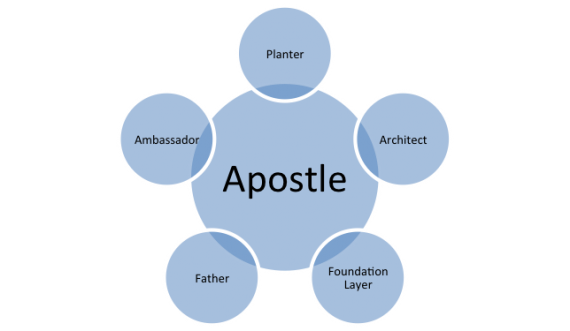
Often times today in our churches the “road” is closed to apostolic leadership & discussion.
The term apostle can provoke all kinds of reactions. What exactly does this word mean? Are there really present day apostles? If so, what do they do? And why does it matter? These are all really important questions. This blog post series is an attempt to look at these questions and point to biblical answers. I have asked Tim Catchim, a great thinker and writer on the apostolic, to write a blog series for us. Here is post two in the series “Are Apostles For Today?” (read the rest of the posts here)
As we continue this series of posts on apostles, we should probably give a brief description as to the kind of ministry that is associated with an apostle. As the word itself suggests, it is the quintessentially missional ministry as “sentness” is written into it (apo= separate stello = sent.)
We see this definition being played out for us in the book of Acts when Paul and Barnabas join up to go on their first missionary journey (Acts 13:1-8). A quick snap shot of this story will help illustrate what apostolic ministry is about.
As Paul and Barnabas are worshiping with other disciples at Antioch, the Holy Spirit says to them “Now separate to me Barnabas and Paul for the work to which I have called them.”
For Paul and Barnabas, the separation (apo) took place when they left the Antioch church. The sending (stello) aspect of their calling took place when they planted new churches in various places and people groups.
One of the signs that you might be an apostle is if you have a pattern of breaking away from existing ministries, projects, churches or organizations in order to start something new. It may sound strange, but relationally speaking, apostles typically don’t have a problem separating from the group and moving on to new ventures. But don’t confuse an apostle’s tendency to “move on” as coming from a lack of concern for those in the group. No, as Paul clearly demonstrates in his second missionary journey, apostles have a genuine concern about the health and viability of the groups they have invested in. Paul revisits his churches to encourage and strengthen them. Like a father who is concerned about the purity and relational integrity of their daughter, mature apostles have a genuine concern for the groups they have poured into (II Corinthians 11:1-2).
So the wiring of apostles to “move” is not fueled by a disdain for the group (although some immature apostles do sometimes fall victim to this trap.) No, the pattern of movement from one venture to the next is actually generated by their appetite for adventure. As those who are drawn to the frontier, apostles represent the most pioneering of the APEST giftings. Being sent necessitates a separation from the settlement, and without this break, no sending would take place.
If being sent is built into the definition of what it means to be an apostle, then apostolic ministry will always have a movemental quality to it. Apostles will either demonstrate a pattern of continuously pressing out beyond the boundaries of the group to engage in mission, or they will seek to decentralize (i.e. apo=separate) the group in order to mobilize it for mission (i.e. stello=mission). Either way, apostles will have a boundary crossing, missional quality to their ministries.
Paul’s Metaphors For Apostle
If we use I and II Corinthians as our guide, we can get a good picture of what apostolic ministry is about. Paul uses at various metaphors in these letters to describe himself and the nature of his ministry. Lets take a quick look.
1. Planter: Paul sees himself as a planter of the gospel into unbroken soil. This is perhaps one of Paul’s most organic metaphors for apostolic ministry. All contemporary apostolic ministry shares in this planting function. (I Cor 3:6-8)
2. Architect: Our translations use the word “master builder,” but the exact wording in Greek is archetekton; arche meaning origin or first, and tekton meaning craftsman or planner (it’s where we get our word technology from.) This one word is loaded with notions of design, innovation and strategic craftsmanship. Apostles envision a “building project” from beginning to end much like an architect envisions a house from blueprint through construction, to the last nail and roof shingle. They think systematically about how to build something from the ground up, in the most efficient, effective way. (I Cor. 3:10)
3. Foundation Layer:Paul qualifies the construction metaphor of architect by limiting it to the initial phases of building. Architects may envision the entire project from start to finish, and sketch plans accordingly, but the apostle’s primary work is focused upon laying solid foundations so others can finish the building project. They begin with the end in mind, but they end their work with another beginning in mind. (I Cor. 3:10-15)
4. Father: Paul sees himself as a father to his churches because he was the initial catalyst who brought them into existence by the gospel. (I Cor. 4:14-21)
5. Ambassador: Ambassadors were people who were sent to represent and announce the will of the King or Emperor. They were often sent ahead to announce the arrival, and declare the will, of the King they were about encounter. They are representatives of the ones who send them. (2 Cor. 5:16-21)

Just these five metaphors provide us with a pretty good “job description” of an apostle. There are undoubtedly more metaphors that describe Paul’s understanding of his ministry as an apostle. Words like custodian, co-worker with God, last in the procession, aroma of Christ. All these are helpful word-pictures to help us get our minds around what the ministry of an apostle is to be about. But in the end, we have to keep going back to the literal definition of the word. An apostle is “one who is sent.” And flowing out of their being is a serial impulse to cross boundaries and break new ground for the extension of Christianity.
Recognizing the missional quality of their ministry, we can see why recovering this foundational ministry within the church is so important. It is the apostle who is most inclined to direct the groups’ energies and attention towards issues related to missional extension. Without apostles in the picture, mission often fades into the background, leaving the group ill equipped to engage our greatest assignment…the great co-mission (Matthew 28:18-20). If we want to see the gospel break out of our more locally confined spheres of influence, we will have to allow this trans-local ministry to once again thrive in the life of the group. It is the apostle who has been given as a gift to the church to help equip it for its missional task of making disciples in every place, among every people group. And like the rest of the APEST giftings, we are invited to receive apostles as a gift of grace, opening ourselves up to their influence as we follow the quest to grow and mature into the fullness of Christ (Ephesians 4:7-16).
(Read the rest of the posts in the “are apostles for today” series)

Sign up to receive our blog posts via e-mail and get instant access to our APE Library with videos, seminars, leaders notes, and more.


Excellent article that is very straightforward, informative, and clear. Thanks for your insights and may God continue to grant you wonderful revelations and truth. Blessings in our Savior’s most wonderful name.
John 3:16 For God so loved the world, that he gave his only begotten Son, that whosoever believeth in him should not perish, but have everlasting life.